Background
Timothy Williamson was born on August 6, 1955, in Uppsala, Uppsala Country, Sweden. He is a son of Colin Fletcher and Karina Side Williamson. He has a sister, Bridget.

University of Oxford, Oxford, England, United Kingdom
In 1976 Timothy Williamson received a Bachelor of Arts degree from Oxford University, a Master of Arts and a Doctor of Philosophy degree in 1981.
Shinfield Rd, Reading RG2 7ED, United Kingdom
Timothy Williamson studied at Leighton Park School.
Deanfield Ave, Henley-on-Thames RG9 1UH, United Kingdom
Timothy Williamson studied at Henley Grammar School (now The Henley College).




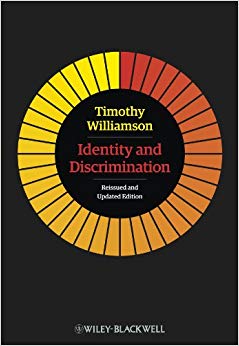
(Identity and Discrimination, originally published in 1990...)
Identity and Discrimination, originally published in 1990 and the first book by respected philosopher Timothy Williamson, is now reissued and updated with the inclusion of significant new material. Williamson here proposes an original and rigorous theory linking identity, a relation central to metaphysics, and indiscriminability, a relation central to epistemology.
https://www.amazon.com/Identity-Discrimination-Timothy-Williamson-ebook/dp/B00B5YUFDM/?tag=2022091-20
1990
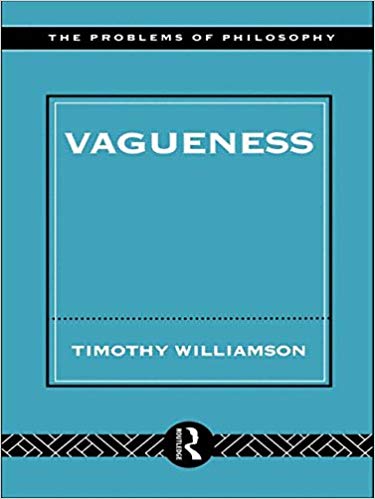
(When did Rembrandt get old? Such questions eventually lea...)
When did Rembrandt get old? Such questions eventually lead us to the problem of vagueness. Williamson traces its history, questions conventional theories and defends the realist view that vagueness is a kind of ignorance.
https://www.amazon.com/Vagueness-Problems-Philosophy-Timothy-Williamson/dp/0415139805/?tag=2022091-20
1994
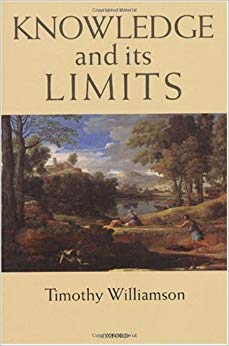
(Knowledge and its Limits presents a systematic new concep...)
Knowledge and its Limits presents a systematic new conception of knowledge as a kind of mental stage sensitive to the knower's environment. It makes a major contribution to the debate between externalist and internalist philosophies of mind, and breaks radically with the epistemological tradition of analyzing knowledge in terms of true belief. The theory casts new light on such philosophical problems as scepticism, evidence, probability and assertion, realism and anti-realism, and the limits of what can be known. The arguments are illustrated by rigorous models based on epistemic logic and probability theory. The result is a new way of doing epistemology and a notable contribution to the philosophy of mind.
https://www.amazon.com/Knowledge-Its-Limits-Timothy-Williamson-ebook/dp/B003VPWYF0/?tag=2022091-20
2000
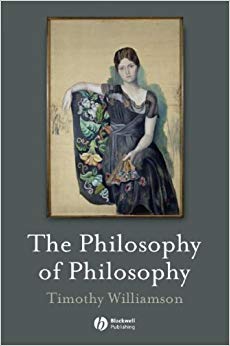
(This book offers an original and provocative take on the ...)
This book offers an original and provocative take on the nature and methodology of philosophy. Based on public lectures at Brown University, given by the pre-eminent philosopher, Timothy Williamson Rejects the ideology of the 'linguistic turn', the most distinctive trend of 20th-century philosophy Explains the method of philosophy as a development from non-philosophical ways of thinking.
https://www.amazon.com/gp/product/B003L784H0/?tag=2022091-20
2007
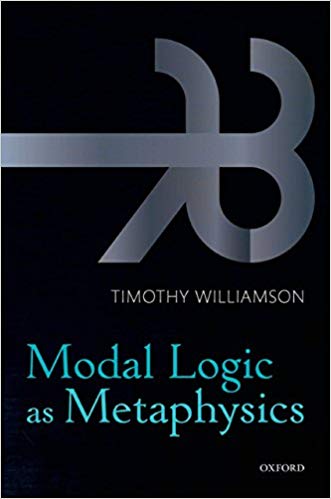
(Are there such things as merely possible people, who woul...)
Are there such things as merely possible people, who would have lived if our ancestors had acted differently? Are there future people, who have not yet been conceived? Questions like those raise deep issues about both the nature of being and its logical relations with contingency and change. In Modal Logic as Metaphysics, Timothy Williamson argues for positive answers to those questions on the basis of an integrated approach to the issues, applying the technical resources of modal logic to provide structural cores for metaphysical theories. He rejects the search for a metaphysically neutral logic as futile. The book contains detailed historical discussion of how the metaphysical issues emerged in the twentieth-century development of quantified modal logic, through the work of such figures as Rudolf Carnap, Ruth Barcan Marcus, Arthur Prior, and Saul Kripke.
https://www.amazon.com/Modal-Logic-Metaphysics-Timothy-Williamson-ebook/dp/B00O143O68/?tag=2022091-20
2013
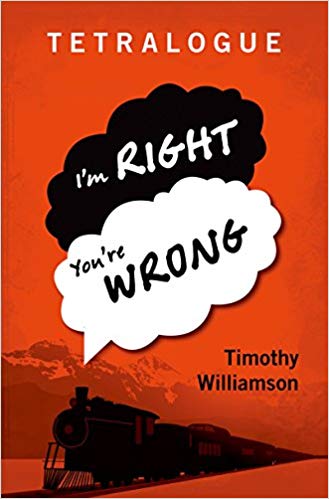
(Four people with radically different outlooks on the worl...)
Four people with radically different outlooks on the world meet on a train and start talking about what they believe. Their conversation varies from cool logical reasoning to heated personal confrontation. Each starts off convinced that he or she is right, but then doubts creep in. In a tradition going back to Plato, Timothy Williamson uses a fictional conversation to explore questions about truth and falsity, and knowledge and belief. Is truth always relative to a point of view? Is every opinion fallible? Such ideas have been used to combat dogmatism and intolerance, but are they compatible with taking each opposing point of view seriously? This book presupposes no prior acquaintance with philosophy, and introduces its concerns in an accessible and light-hearted way. Is one point of view really right and the other really wrong? That is for the reader to decide.
https://www.amazon.com/Tetralogue-Im-Right-Youre-Wrong-ebook/dp/B00QQGA3PE/?tag=2022091-20
2015
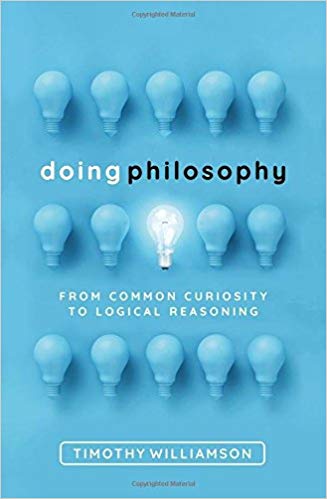
(What are philosophers trying to achieve? How can they suc...)
What are philosophers trying to achieve? How can they succeed? Does philosophy make progress? Is it in competition with science, or doing something completely different, or neither? In Doing Philosophy,Timothy Williamson tackles some of the key questions surrounding philosophy in new and provocative ways, showing how philosophy begins in common sense curiosity, and develops through our capacity to dispute rationally with each other. Discussing philosophy's ability to clarify our thoughts, he explains why such clarification depends on the development of philosophical theories, and how those theories can be tested by imaginative thought experiments, and compared against each other by standards similar to those used in the natural and social sciences. He also shows how logical rigor can be understood as a way of enhancing the explanatory power of philosophical theories. Drawing on the history of philosophy to provide a track record of philosophical thinking's successes and failures, Williams overturns widely held dogmas about the distinctive nature of philosophy in comparison to the sciences, demystifies its methods, and considers the future of the discipline. From thought experiments, to deduction, to theories, this little book will cause you to totally rethink what philosophy is.
https://www.amazon.com/Doing-Philosophy-Curiosity-Logical-Reasoning/dp/0198822510/?tag=2022091-20
2017
Timothy Williamson was born on August 6, 1955, in Uppsala, Uppsala Country, Sweden. He is a son of Colin Fletcher and Karina Side Williamson. He has a sister, Bridget.
Timothy Williamson studied at Leighton Park School and continued at Henley Grammar School (now The Henley College). In 1976 he received a Bachelor of Arts degree from Balliol College, a Master of Arts and a Doctor of Philosophy degree in 1981.
From 1980 to 1988 Timothy Williamson was a lecturer in philosophy at Trinity College, Dublin. From 1988 to 1994 he served as a fellow and praelector in philosophy at University College, Oxford. In 1994 he was a visiting professor of the Department of Linguistics and Philosophy at the Massachusetts Institute of Technology. In 1995 he was a visiting Erskine Fellow of the Department of Philosophy and Religious Studies at the University of Canterbury.
From 1995 to 2000 Williamson was a professor of logic and metaphysics at the University of Edinburgh. From 1998 to 1999 he served as a visiting professor of the Department of Philosophy at Princeton University. Since 2000 he has been the Wykeham Professor of Logic at Oxford. He was a president of the Aristotelian Society from 2004 to 2005.
From 2013 to 2015 he was the Nelson Visitor at the University of Michigan, Ann Arbor. From 2016 to 2017 he was a visiting professor at Yale University. In 2018 he became the A. Whitney Griswold Visiting Professor at Yale University.
He is the author of Identity and Discrimination (1990), Vagueness (1994), Knowledge and Its Limits (2000), The Philosophy of Philosophy (2007), etc.
Timothy Williamson has made major contributions in philosophical logic, epistemology, metaphysics, the philosophy of language and philosophical methodology. He is also best known as the author of Knowledge and Its Limits. In 2015 he received an honorary doctorate from the University of Bucharest and from the University of Belgrade in 2018.
(What are philosophers trying to achieve? How can they suc...)
2017(Are there such things as merely possible people, who woul...)
2013(Identity and Discrimination, originally published in 1990...)
1990(Knowledge and its Limits presents a systematic new concep...)
2000(Four people with radically different outlooks on the worl...)
2015(This book offers an original and provocative take on the ...)
2007(When did Rembrandt get old? Such questions eventually lea...)
1994Timothy Williamson has defended classical logic in connection with the sorites (or heap) paradox, by appeal to epistemicism, the view that vagueness is ignorance. His knowledge first approach has reversed the traditional order of explanation in epistemology. In metaphysics, he has argued in favour of necessitism – the view that what there is (ontology) is metaphysically necessary, not contingent. In the philosophy of language, he has argued that one must (in a certain privileged sense, constitutive of assertion) assert only what one knows; and he has defended a principle of charity according to which the best interpretations of a language maximize the attribution of knowledge (rather than true belief) to its speakers.
Methodologically, Williamson opposes naturalism and defends instead the use of "armchair" methods to answer substantive questions; in practice, his work is often characterized by the application of formal techniques, both logical and mathematical, to traditional philosophical problems.
Timothy Williamson is a foreign member of the Norwegian Academy of Science and Letters, a member of the Academia Europaea, an honorary member of the Royal Irish Academy, a foreign honorary member of the American Academy of Arts and Sciences, and a member of the Institut International de Philosophie.
Timothy Williamson is married to a pianist, Ana Mladenoviæ Williamson. His three children are Alice, Conrad and Arno.
